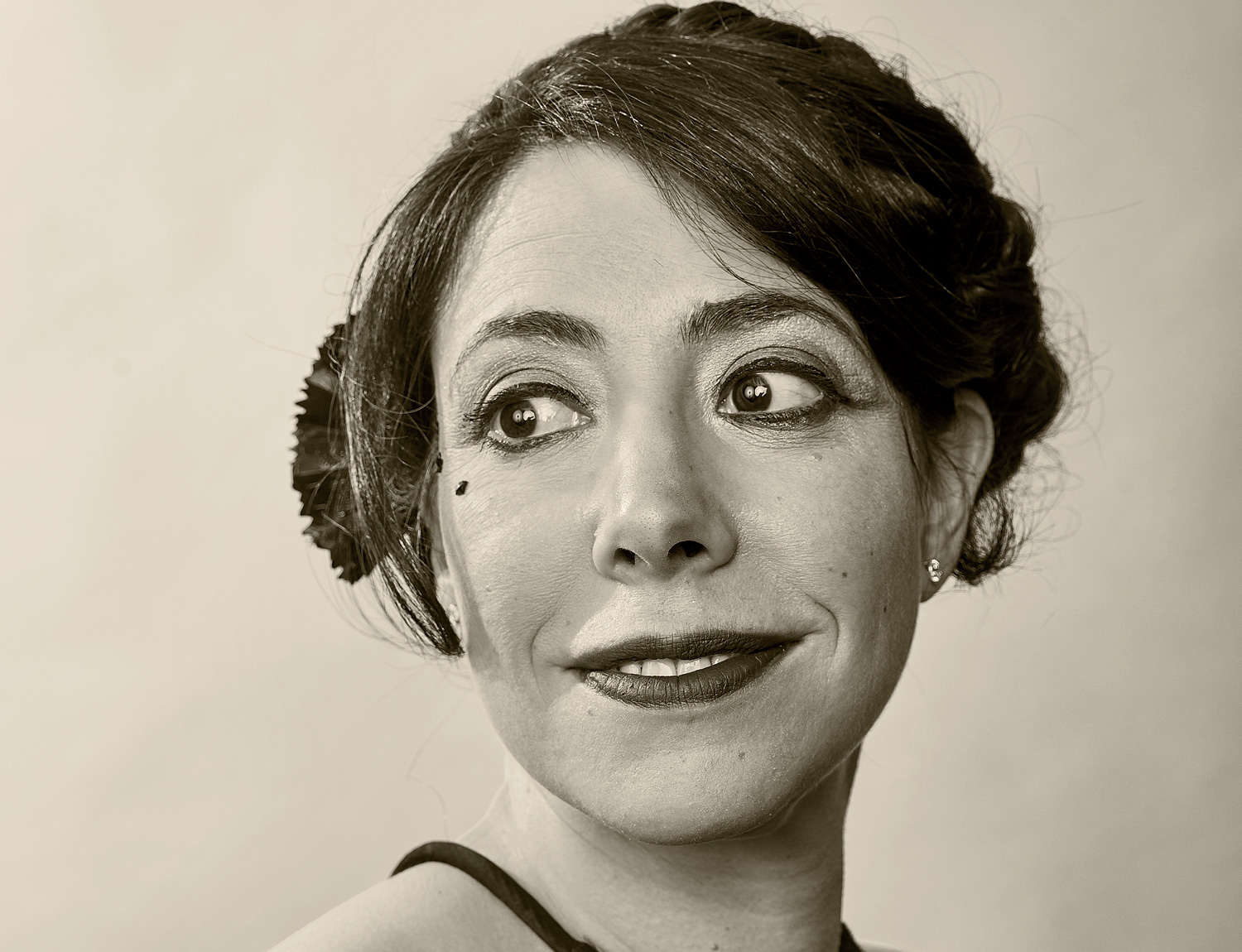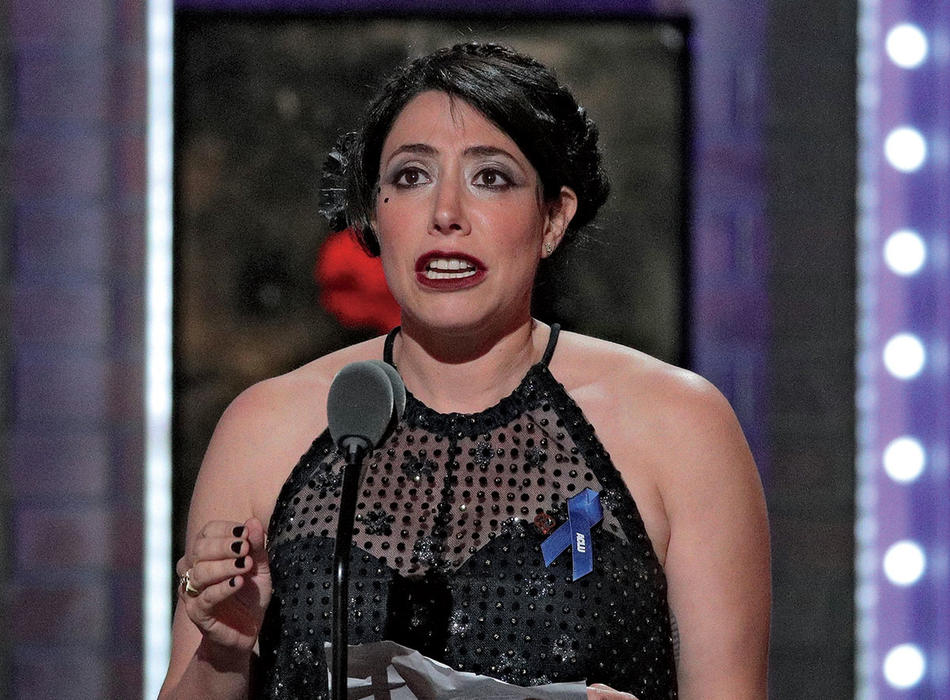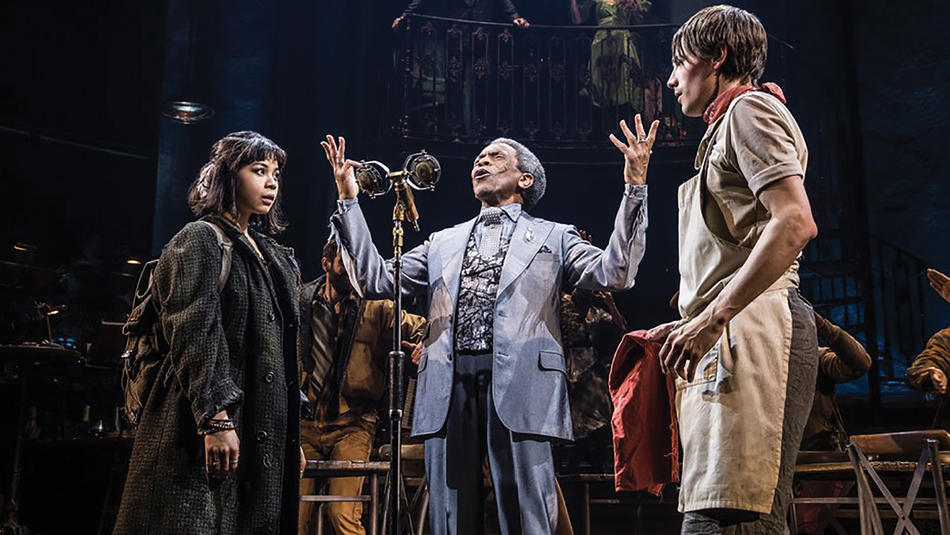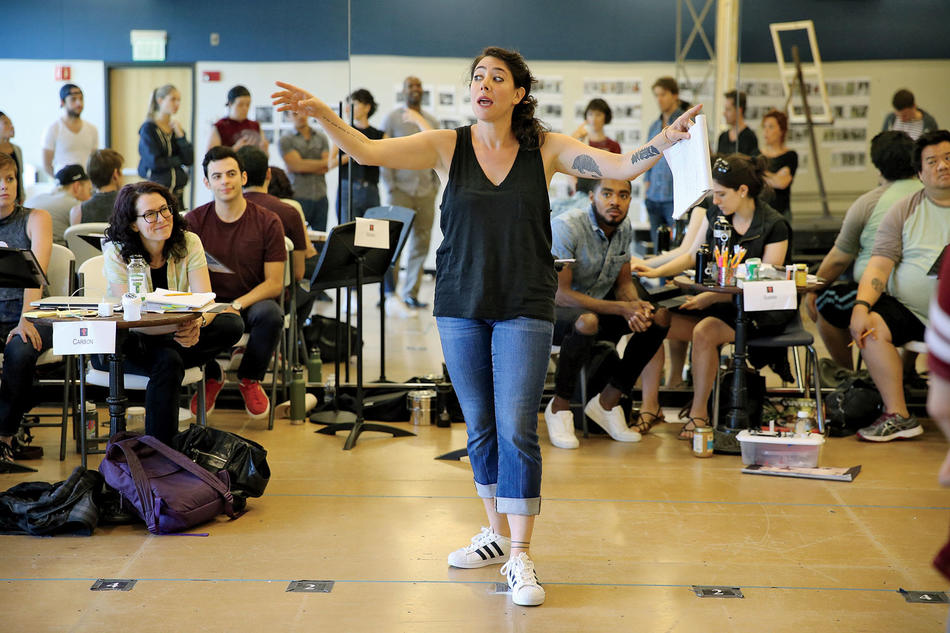
Making her way to the stage of Radio City Music Hall to accept the 2019 Tony Award for best direction of a musical, Rachel Chavkin ’08SOA was thinking about time. She had all of ninety seconds to get to the microphone and deliver her speech, which was written on a much-creased piece of paper folded in her hands. Seven months pregnant, Chavkin, thirty-eight, was not about to sprint. As she told Columbia Magazine days later, “I warned my husband: if they call my name, I won’t have time to hug you!”
Hadestown, an enthralling, profoundly moving retelling of the myth of Orpheus and Eurydice, would, by night’s end, capture eight awards, including best original score and best musical. The accolades were not only hard won — Chavkin, a leading light of experimental theater, and Anaïs Mitchell, a singer-songwriter from Vermont, shaped and refined Hadestown for seven years — but also, some might say, overdue. In seventy-three years of the Tony Awards (named after Antoinette Perry, an actress, director, and theater advocate), Chavkin became just the fourth woman to win for best direction of a musical, joining Julie Taymor (The Lion King), Susan Stroman (The Producers), and Diane Paulus ’97SOA (Pippin). And in 2019, out of twelve new musicals on Broadway, Hadestown was the only one directed by a woman.
The show, playing at the Walter Kerr Theatre on West 48th Street, is set mostly in a New Orleans–style barrelhouse at a time of economic and environmental decay. In the opening number, the narrator, Hermes (André De Shields, Tony winner for best featured actor in a musical), hints at the cyclical power of storytelling and the catharsis to come: “It’s a sad song / It’s a sad tale, it’s a tragedy / It’s a sad song / But we sing it anyway.” The messenger of the gods has little use for spoiler alerts.
Driven by Mitchell’s expressive, bluesy, Americana-soaked songs, Hadestown tells the story of angel-voiced Orpheus (Reeve Carney), a musician who falls for the penniless drifter Eurydice (Eva Noblezada). They are deeply in love, but money is scarce, and so Eurydice, hungry and desperate, journeys to Hadestown, an industrial netherworld ruled by the powerful Hades (Patrick Page). Hadestown’s indentured laborers, a chiseled crew who could have stepped off a WPA mural, are engaged in the endless task of building a wall to keep out the poor. (Any resemblance to current events is unintended: the song “Why We Build the Wall” was written in 2006.)
Pining for Eurydice, Orpheus heads to Hadestown, intent on charming Hades with a song to win his lover’s release. His passion both moves and infuriates Hades, who has grown apart from his own wife, the forlorn, hard-drinking Persephone (Amber Gray). After Hades grudgingly — and with strict conditions — sets the lovers free, he and Persephone watch them leave. “Think they’ll make it?” Persephone asks. To which the king of the underworld somberly replies, “I don’t know.”
A modern version of an ancient Greek myth might seem an unlikely Broadway blockbuster — and Chavkin, who has never concerned herself with commercial viability, might seem an unlikely Broadway conqueror — but when the Tony nominations were announced in April, Hadestown led the pack with fourteen. This gave Chavkin plenty of time to think about a potential acceptance speech and what she might really want to say to the millions of theater lovers who would be watching the ceremony that night.
“Amber [Gray] is one of my best friends, and we both live in Brooklyn, so we’d take the train home late at night after the show and drill each other on our speeches,” says Chavkin. “And she told me: ‘Cut all the names. You have to be able to get to the second half. It’s really important you get to the second half.’ And I was very happy that I had written it down, because I was so nervous that I’d never have remembered it.”
Onstage, Chavkin, poised but anxious, thanked her husband, their families, and Anaïs Mitchell. Then, as the TV cameras rolled, she got to the second half: “My folks raised me with the understanding that life is a team sport. And so is walking out of Hell. That’s what’s at the heart of this show. It’s about whether you can keep faith when you are made to feel alone. And it reminds us that that is how power structures try to maintain control: by making you feel like you’re walking alone in the darkness even when your partner is right there at your back. And this is why I wish I wasn’t the only woman directing a musical on Broadway this season.”
Cheers broke out. Chavkin had passed the ninety-second limit, but no one was counting anymore. Her right hand accompanied her careful enunciations with a conductor’s thrust and bounce. “There are so many women who are ready to go,” she told the audience, her voice full of feeling. “There are so many artists of color who are ready to go. And we need to see that racial diversity and gender diversity reflected in our critical establishment, too.
“This is not a pipeline issue. It is a failure of imagination by a field whose job is to imagine the way the world could be.” Over the swelling applause, Chavkin sealed her words with a director’s command: “So let’s do it.”
The road to Hadestown, and to Chavkin’s speech, began in 2012, in a red-curtained, portrait-lined nineteenth-century Moscow supper club. This was the set for Natasha, Pierre & the Great Comet of 1812, adapted by composer Dave Malloy from a seventy-page slice of Tolstoy’s War and Peace. Playing at the Ars Nova theater on West 54th Street, this “electro-pop opera,” under Chavkin’s direction, was getting serious buzz.
One evening, Anaïs Mitchell dropped by to see it. Mitchell had been trying to get her 2010 folk-opera album Hadestown to the stage for two years, and she recalls the shock of seeing Great Comet. “I was just completely bowled over,” she says.
Chavkin used immersive staging, putting the actors and musicians in the audience and seating several audience members at café tables on the stage. Troupe members served free pierogies and vodka throughout the show, and the action of the play regularly wound through the orchestra and mezzanine.
“I loved the moment-to-moment visual delight,” Mitchell says. “Rachel is just so good at crafting these delicious visuals — there was an unpredictable, infectious joy in that piece.” When Mitchell approached Chavkin with her Hadestown album, Chavkin loved it instantly, and the two artists got together. They talked about the holes in the story where new songs might be needed and the possibility of adding a libretto to connect the songs. “A few hours into the conversation,” recalls Chavkin, “Anaïs said, ‘I’ve been working on this a long time, and it’s hard for me to imagine opening up this stuff and going back in.’ And I said, ‘If we’re doing this, you’re going to have to get over your sense of fatigue.’
“And she did. Anaïs is one of the most rigorous people I’ve ever met: not only did she dive back in, she also drove me to work harder.”
Chavkin began her visual research, which she typically does both online and at the main research branch of the New York Public Library in Midtown. Chavkin is known for her visual inventiveness, but she still recalls the awe she felt at seeing Julie Taymor’s “breathtakingly beautiful”work and confesses that she worries about being “visually boring.”
Those fears seem to be unfounded. The first image she had for Hadestown came to her while she was listening to the heartrending lover’s anthem “Wait for Me.” Chavkin envisioned long-stemmed lights suspended from above, swinging in the underworld’s darkness. This idea would become one of the show’s most arresting images, evoking the lonesome, searching beams of miners’ headlamps.
“Rachel is especially good with music, creating visual partnership with music from moment to moment,” says Mitchell. “And for me, coming from the music world and having a steep learning curve for figuring out how to tell a satisfying story through music, this was exactly the partnership I needed. Rachel has pushed me to go further with the writing than I ever would have considered. She’s a tough, smart, loving, relentless dramaturgical partner.”
“I’ve always been drawn to group effort — it’s inextricable from the worldview I was raised with,” says Chavkin, who grew up in Silver Spring, Maryland, the only child of two lawyers. Chavkin’s mother focused on Medicaid policy, her father on civil-rights issues. Their house was full of novels and plays, as well as books on history and politics. Belief in workers’ rights and universal health care was an article of faith around the kitchen table.
From the age of four through high school, Chavkin played on a soccer team. Her father was the coach. “We weren’t very good,” Chavkin says, laughing. “There were a couple of chicks who were incredible, but I was never a particularly good player. What I loved, and thrived on, was the idea of a shared fate.”
Her father often took her to the theater, and at eleven, Chavkin began attending Stagedoor Manor, a summer theater camp in Loch Sheldrake, New York, where she reveled in “the fellowship, the people, the team aspect of a cast.” But the rapture really struck her at sixteen, when she saw, at the Studio Theatre in Washington, a “raw, immersive” production of the musical Hair, with its anarchic energy and moral clarion call.
Chavkin knew she wanted a life in theater. She enrolled in NYU in 2003 to study acting and directing, and she took advantage of her Lower Manhattan surroundings. “I fell madly, madly in love with the downtown theater world,” she says. She saw shows almost nightly, volunteering as an usher or getting free tickets from professors. One show, called House/Lights, put on by the influential experimental-theater company the Wooster Group, was especially revelatory, using simulcast video monitors and synthesizers to create a dizzying range of visual and audio effects. “It was very freeing to understand that theater can look like that,” Chavkin says.
In her junior year, Chavkin started creating her own work, staging shows in empty classrooms and a bar basement; her favorite was an adaptation of “Howl,” by Allen Ginsberg ’48CC, with modern dance and bebop. Then, seeking adventure and a bigger audience, Chavkin got together with five classmates and took a show to the Edinburgh Festival Fringe, an arts-and-culture event held annually in Scotland.
Chavkin named the troupe the TEAM, reflecting its collaborative structure, in which members develop material together without any individual authorship. In Edinburgh, the TEAM, with Chavkin as artistic director, presented an original work called Give Up! Start Over!, about a woman who swallowed her television and is the subject of a scientific experiment. The show, which incorporated video and other media, won a coveted Fringe First Award.
After graduating from NYU, Chavkin was hired as a teaching assistant there. “I just loved teaching,” she says. “And I knew that if I wanted to teach I needed an MFA. I thought I’d really like to be a theater professor.”
She entered Columbia’s School of the Arts to get her MFA in theater directing and immediately had second thoughts. While she loved the academic environment, she fretted that school would distract her from her creative work. “I did try to drop out of graduate school several times during my first year,” she says.
Fortunately, Anne Bogart, head of SOA’s directing concentration, talked her out of it. “Rachel literally followed me down Broadway,” Bogart remembers. “She said, ‘Tell me, Anne — what’s your opinion?’ I turned around and said, ‘Are you out of your mind? Get your MFA, use Columbia for everything it’s worth, use the rehearsal spaces, work with your company on projects while you’re here, and get it done.’”
With Bogart’s blessing, Chavkin used her classes at Columbia to develop her own shows. Chavkin began to make bold, idiosyncratic works — ambitious, erudite, and overflowing with ideas. “I’ve seen her work change and develop and become much more poignant over the years — poignant for me personally,” says Bogart, who is cofounder of the theater company SITI (Saratoga International Theater Institute) and a prolific and provocative innovator. “Her work went from being very rambunctious and impressive to a place where now I’m actually crushed by what she does.”
Chavkin, who calls Bogart “profoundly influential,” created two shows with the TEAM while at Columbia. Particularly in the Heartland (set on a Kansas farm and featuring space aliens, Robert Kennedy, and a businesswoman named Dorothy) and Architecting. “I’m obsessed with looking at the past through a contemporary lens, or looking at the present through the lens of the past,” Chavkin says. In Architecting, set in a New Orleans bar after Hurricane Katrina, characters include historian Henry Adams and Gone with the Wind author Margaret Mitchell, transposed into a present-day dystopia of real-estate development and disaster capitalism.
Chavkin also took classes with theater historian Arnold Aronson (“a wonderful mentor”), an expert on scenography and avant-garde theater. And she calls studying Chekhov with Brian Kulick, a writer and veteran Shakespeare director who today is the chair of SOA’s theater program, “one of the great joys of my intellectual life.” Kulick’s teaching of Uncle Vanya through the lens of Martin Heidegger’s writings on boredom was “so far-out and deep that when I directed that show it was wildly inspired by Brian’s teachings, and that remains one of my favorite things I’ve ever directed.”
That’s saying a lot, given the breadth of Chavkin’s work. In 2016, she won an Off-Broadway Theater Award, or Obie, for her direction of a Lincoln Center production of The Royale, a stylized drama by playwright Marco Ramirez inspired by African-American boxing champion Jack Johnson, which the New York Times praised as “staged with a = swift, stark lyricism by the impossibly versatile Rachel Chavkin.” Since then, Chavkin’s directing credits include Caryl Churchill’s Light Shining in Buckinghamshire (New York Theatre Workshop), Bess Wohl’s Small Mouth Sounds (Ars Nova and a national tour) and Continuity (Manhattan Theatre Club), and Arthur Miller’s The American Clock (in London at the Old Vic). Then there’s Matt Gould and Carson Kreitzer’s Lempicka (Williamstown Theatre Festival), a musical about a Russian woman who flees the 1917 revolution with her husband, becomes a painter in Paris, and falls in love with a prostitute. Chavkin wants to bring Lempicka to Broadway.
But her biggest show before Hadestown was Great Comet, which closed abruptly on Broadway in 2017 under difficult circumstances. Like the creators of the musical Hamilton, Chavkin and Malloy are committed to diversity, and much of the cast of Great Comet was nonwhite, including the heroine, Natasha, played by Denée Benton. “If a show isn’t about race, then I don’t think there’s any reason to have an all-white company,” Chavkin says.
But when the show’s lead, pop star Josh Groban, left and was replaced by Hamilton alum Okieriete Onaodowan, ticket sales dropped. The producers, desperate to save a slumping box office, sought to replace Onaodowan with Tony and Emmy Award–winning actor Mandy Patinkin. The decision to replace a younger Black actor with an older white actor resulted in an angry backlash against the show across social media; Patinkin withdrew, and the show shut down.
“I’m not living in the past with regret,” Chavkin says of the experience. “That situation was complicated. But this time around I’m definitely more alert to the powers of social media and the need to be proactive.”
Chavkin and Malloy are now working on a new production, based on another literary behemoth, this one by Herman Melville. On December 3, the American Repertory Theater in Cambridge will stage the world premiere of Moby-Dick, a musical directed by Chavkin, with book, music, and lyrics by Malloy.
Chavkin and Malloy have been pursuing Moby-Dick since 2014. Chavkin, noting that Captain Ahab’s ship, the Pequod, is “a ship of hunters,” has lately been watching YouTube videos of hunters skinning deer. The show will involve, among other things, puppetry. Says Chavkin: “I think there will be a lot of dismembered puppets.”
She and Malloy are thinking of the Pequod as representing the promise of American democracy. “It’s a ship that includes people from all over the globe, gathered together in pursuit of this single goal,” Chavkin says. “But undeniably, in the novel and in this production, they are under the leadership of this old, failing white man, Captain Ahab. So there’s a huge subtext of white supremacy and the failure of this egalitarian promise of the Pequod.”
Chavkin says she is “pathologically focused” on her craft and that she “is interested in having as eclectic a career as possible,” so it’s not surprising that her life revolves around her work: reading scripts, casting, researching, rehearsing. An avid consumer of art and entertainment, she sees shows as often as she can, listens to podcasts on the subway, and occasionally watches TV with her husband, Jake Heinrichs, owner of a theatrical-lighting installation company and lighting designer for the TEAM. She prefers work to leisure, though “I’m learning to try to be better about that,” she says.
As Columbia Magazine went to press, Chavkin was days from giving birth, having carried the baby for close friends, a gay couple in Texas. Chavkin had wanted the experience of being pregnant, and her friends wanted a child, so she went for it. At this point, she does not plan to have her own children: she loves having a theater “family,” she says, one that comes from working with people she trusts and respects.
For Chavkin, everything goes back to the group, the “shared fate,” and the possibilities of democracy, artistically and societally. She doesn’t ask any more of others than what she willingly — joyfully — asks of herself. For her, the real profits of theater are to be found in a doctrine of openness and inclusion.
“I’m pretty rigorous about making sure to work with new people,” she says. “They’ll push me in different ways and not let me stay within the limits of my imagination.”
This article appears in the Fall 2019 print edition of Columbia Magazine with the title "Hell-Raiser."





